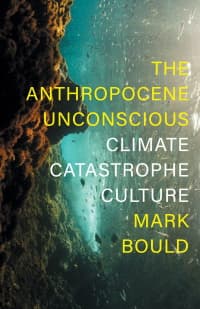
The Anthropocene Unconscious by Mark Bould
(Verso Books, 2021)
Reviewed by Jamie Mollart
In 2016 the acclaimed Indian author, Amitav Ghosh, wrote ‘The Great Derangement: Climate Change and the Unthinkable’, widely considered to be one of the most important books to address the way Climate Change is approached in literature.
He argues future generations will be amazed at the way in which we have collectively ignored the most pressing threat to our species within our collective art and literature. He uses the term ‘Anthropocene’ specifically in reference to our attempt at terrestrial destruction rather than the literal definition of ‘age of man’.
As a writer he has produced many novels around the issue—his latest Gun Island most overtly—but he suggests literature, particularly serious literature has been avoiding Climate Change as a subject and this needs to change. He asserts literature is the perfect form for a discussion about the problems we face and only by moving this discourse out of the scientific and into the common vernacular can we begin to face it.
It’s an interesting viewpoint, and one I agree with; art does have a place in raising awareness about Climate Change. Mark Bould, however, suggests Ghosh is missing the point and Climate Change permeates all our cultural outputs at a much more subconscious level. He argues discussions around fiction and Climate Change generally operate in a very small sphere and only in the context of ‘Cli-Fi’, whereas a fear of anthropogenic climate destabilisation is so deeply ingrained in our collective psyche every piece of fiction, no matter the genre or medium, is unconsciously talking about Climate Change.
Bould, a film critic and theorist, sets out to prove his theory, and in doing so disprove Ghosh, by delving into our contemporary culture, searching for this thread of subconscious fear.
I entered this book excited as it’s a that is topic personally interesting. It came with an endorsement from China Mievelle, one of our most forward-thinking writers, and I agree with the central tenet. So, it was with frustration I found myself struggling with the book, in particular how the argument is structured and the tone of it.
I get the impression he was unsure of how to position the tone—it’s times so academic as to be prohibitive to the average reader and then at others so low brow it feels deliberately dumbed down. It’s at the same time irreverent and utterly humourless, and the constant flipping of tone makes it a disorientating read, which means the central argument is partially lost.
This schizophrenia also applies to his choice of examples. They veer wildly between Sharknado, Karl Ove Knausgård, Zombie films, The God of Small Things, the obscure film Dead Slow Ahead and Richard Powers. If the argument is that all our artistic outpourings discuss Climate Change, then his choice of subjects is not entirely representative of the collective psyche, and I get the impression he’s simply talking about things he likes.
Where he is at his best is when talking about science fiction, especially Arthur C. Clarke, Ballard and films such as Denis Villeneuve’s Arrival and the Tom Cruise vehicle Edge of Tomorrow. In fact, the most coherent argument in the book relates to the latter, drawing a direct correlation to the fact that Cruise’s character repeats his mistakes over and over again until he reaches the point of no return with one chance left to fix things, and our fast reaching the point of Climate no return.
There is also a wonderful section on Richard Power’s magisterial The Overstory, which draws out a section in which one character photographs a tree on his family farm from exactly the same location, once a month until his death, and then the task is handed down through the family, eventually turning 913 photographs taken over 76 years into a 38 second film. This metaphor of the transience of human life on the planet is beautifully drawn and illustrates how a single photograph cannot demonstrate the full power of nature, and only through art can humankind grasp the magnitude of what we’re facing. The Overstory is full of trees, our viewing of them, our relationship with them, the way we commoditise them and the way in which our destruction of them is pulling the lungs out of our planet, all told with Climate Change in the background—a perfectly chosen example to bolster Bould’s argument.
At its most frustrating, large sections of the book are Bould falling back into film critic mode, rolling out descriptions of plots of films or books, with little or no context or relation to his principal argument. This is illustrated by the baffling inclusion of the Fast and Furious series as an end point. I can see why he would want a blockbuster series to contrast with the opposition for Petro capitalism, but the idea each of the franchise grossed less because our collective unconscious is shifting away from a love of petrol is a stretch too far.
Ultimately, I was left thinking somewhere in here is something clever and important. But either through obliqueness of argument, uneven tone, or examples presented, I struggled to find a coherent argument both against Ghosh’s assertions or one that truly convinced me of Bould’s central idea, even as I want to believe it, leaving it a frustratingly missed opportunity.
Review from BSFA Review 16 - Download your copy here.
